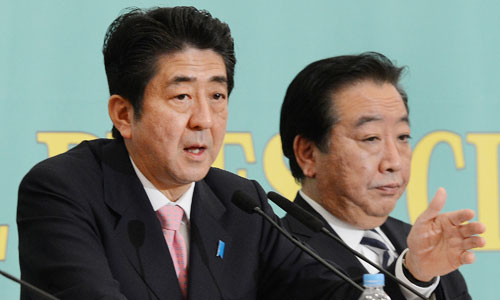Abe’s right-wing agenda rings alarm bells

Japan's incoming prime minister Shinzo Abe toned down his hawkish rhetoric Saturday, when he decided not to station officials on the disputed Diaoyu Islands for the time being, sparking another round of speculation over whether the hawkish leader will push his right-wing agenda during his second tenure as prime minister.
As leader of the Liberal Democratic Party (LDP), Abe proposed during his election campaign that government employees be stationed on the islands, and suggested Japan use retired Self-Defense Force vessels to defend them.
However, Abe said Saturday that he decided to postpone the stationing plan, according to the Kyodo News.
"We want to make efforts to reset ties and start developing a mutually reciprocal relationship (with Beijing)," Abe was quoted by Kyodo as saying.
"Through this decision, Abe is sending a signal in an attempt to alleviate the currently strained relations," Liu Jiangyong, an expert on Japanese studies at Tsinghua University, told the Global Times.
He added that Abe also made the decision because strained bilateral ties would cast the LDP in a negative light in the coming Upper House election due in July next year. Abe's LDP suffered a heavy defeat in the Upper House election during his last tenure.
According to the Xinhua News Agency, Abe is also planning to send Masahiko Komura, head of the Japanese Association of Lawmakers for Friendship with China, as a special envoy to defuse the simmering tensions with China.
Watchful eye
Although Abe postponed the stationing plan, he also said that "there is no change in our thinking" of stationing officials on the islands, indicating the plan might be re-endorsed, Kyodo reported.
Liu noted that continued attention should be paid to the foreign policy and remarks on historical issues of the right-wing leader, who has often said his reason for entering politics is to help Japan "escape the post-war regime" and throw off wartime guilt.
In the first news conference after the LDP's landslide success in the general election, Abe reiterated that the Diaoyu Islands were "inherently Japanese territory," indicating that he would not back off from his former hard-line stance.
"I want to show my strong determination to prevent this from changing," he said.
On the same day Abe decided to roll back the stationing plan, tensions over the Diaoyu Islands again flared up when Tokyo scrambled military jets to intercept a Chinese marine surveillance plane near the islands, according to the Kyodo News.
Meng Xiangqing, deputy director of the Strategic Research Institute at the National Defense University of the PLA, told the Global Times that the second journey by a Chinese marine surveillance plane near the islands indicates the integration of air and marine surveillance has become routine.
"The situation has permanently changed since September 10. Once we step in, we will not step back," he said.
"The tension over the islands is much more intense than that over the Yasukuni Shrine. Neither country will back off this time, and a military confrontation is likely to occur at any time," Ni Feng, an expert on American studies at the Chinese Academy of Social Sciences, told the Global Times.
US influence
Unlike Abe's last tenure, when he chose to visit China on his first overseas diplomatic trip and lifted bilateral relations out of the deep freeze caused by his predecessor Junichiro Koizumi's annual visits to the Yasukuni Shrine, Abe's first trip overseas will be to the US this time.
"Abe chose to visit the US first because he hopes the military clout of its ally can help deter China," Ni noted.
The US Congress passed Friday the National Defense Authorization Act for fiscal 2013, reaffirming that the islands were subject to the Japan-US security treaty.
The bill shows the US has "made the most explicit determination to take the side of Japan in this evolving dispute," Vijay Prashad, professor of International Studies at the Connecticut-based Trinity College, told the Global Times.
Chinese foreign ministry spokesperson Hua Chunying slammed the bill Sunday, saying the Japan-US security treaty, as "a bilateral arrangement in a special historical time," should neither harm the interests of any third parties, including China, nor be involved in any foreign territorial disputes.
Military buildup
During the election campaign, Abe also vowed to increase military spending and lift constitutional restrictions in order to upgrade the Self-Defense Force to a national defense force, and enable Japan to exercise the right to collective self-defense.
A report released Wednesday by Japan's National Institute for Defense Studies said that "policy coordination" between the Chinese military and the maritime administrative departments was "improving," and warned that China might mobilize its military in maritime disputes.
Huang Dahui, an expert on Japanese studies with the Renmin University of China, told the Global Times that the report "depicting China's military threats" could provide another pretext for Abe to increase military spending.
According to a survey by Kyodo, 81.1 percent of the newly-elected representatives of Japan's Lower House support the country exercising its right of collective self-defense.
But analysts argue that obstacles make the revision difficult. It requires the approval of a two-thirds majority in both houses and support from more than half of voters in a national referendum.
However, Thomas U. Berger, professor of International Relations with Boston University, warned that there would be "some major changes" through reinterpretation of the constitution even if the amendment is not achieved.
"In fact, much of what the alliance has needed in the past has been achieved through reinterpreting the constitution," he told the Global Times.